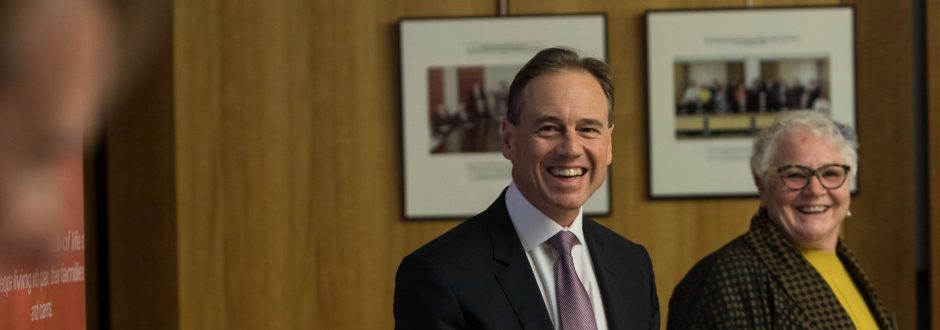Good Samaritan Sister Mary-Lynne Cochrane has accepted countless invitations in the last few years to speak publicly about her experience living with chronic pain. She’s said yes to media interviews, addressed conferences and even started an online petition.
Sharing her story in such a public way hasn’t always been easy, but Mary-Lynne has done so to raise awareness about the millions of Australians who face chronic pain daily, and to help them access better pain management strategies.
Last month Mary-Lynne received an invitation she couldn’t refuse: the chance to speak directly to Australia’s Federal Minister for Health, Greg Hunt, at Parliament House in Canberra.
The occasion was the Annual General Meeting of Painaustralia, the nation’s leading pain advocacy body, and Mary-Lynne was to deliver the opening address.
“I was excited that I had the opportunity to speak to him face-to-face,” Mary-Lynne told The Good Oil. “I thought, ‘this is a man who could make a difference’.”
Not only was Mary-Lynne able to speak directly to the Minister, she also had a captive audience of about 70 healthcare professionals, advocates and consumers who were attending the meeting. Among them was Labor’s Shadow Minister for Health, Catherine King, and Painaustralia’s new Patron, Air Chief Marshal Sir Angus Houston AK, AFC (Ret’d).
In a very honest and engaging address, Mary-Lynne explained how, since her early 20s, she has lived with an undiagnosed form of arthritis which has led to more than 20 surgeries, “constant chronic pain” and, until recently, dependence on a range of prescription opioids.
“Chronic pain and the side-effects of heavy pain-killers took a massive toll on my life,” said Mary-Lynne.
“[The pain-killers] made me sleepy, I put on weight, and my pain still became uncontrollable. All this took its toll on me emotionally and I experienced depression.”
Mary-Lynne told her audience that in her early 40s doctors advised that, due to her condition, she should end full-time work because she would eventually end up in a wheelchair.
“It took me a very long time to come to terms with this loss. I felt that I had no control over my life,” she said.
Mary-Lynne also described her experience of visits to two pain clinics where she “willingly” embraced a range of treatments based on advice that it was “the only thing to do”. Yet for her, these interventions were at times worse than the pain itself.
“This was the lowest part of my pain journey: I was emotionally drained, depressed, dependant, drugged and still the pain persisted,” she said.
A major turning point for Mary-Lynne came about five years ago, when she discovered a pain program at Sydney’s Greenwich Hospital which introduced her to a multidisciplinary approach to pain management. This program included support from pain physicians, physiotherapists, psychologists and nutritionists – and for Mary-Lynne, was “by far, the most effective intervention” she had experienced.
“This experience taught me to manage my pain rather than let pain manage me,” she said.
Since then, Mary-Lynne said she has continued to embrace a multidisciplinary pain management approach at bounceREHAB, a private clinic in Sydney, where she participates in a five-day program that includes physiotherapy treatments, clinical Pilates, remedial massage, as well as nutritional and psychological support.
“I am acutely aware that not everyone has this opportunity,” said Mary-Lynne. “But this approach has managed my pain without medications as well as prevented me having any further surgeries for the last four years.”
Toward the end of her address, Mary-Lynne referred to the Change.org petition she initiated in December 2017 in collaboration with Painaustralia. With nearly 5,000 supporters so far, it urges Australia’s politicians to create better services and support for people with chronic pain, and better rebates through Medicare for allied healthcare.
Mary-Lynne also invited Minister Hunt to visit bounceREHAB and experience the “innovation and forward-thinking of this clinic” – an invitation he has since accepted.
“If only others in my position could have the ability to receive the treatments I have had over the last five years of my life?” Mary-Lynne said to the Minister.
Attending Painaustralia’s AGM was a “positive” and “empowering” experience for Mary-Lynne. But the highlight was the Minister’s announcement of funding for a national action plan on chronic pain management which was endorsed by Shadow Minister for Health, Catherine King.
“That was really heartening for me that the Shadow Minister and the Minister worked together to achieve this outcome,” said Mary-Lynne.
Carol Bennett, Chief Executive Officer of Painaustralia, was also buoyed by this bipartisan approach to what is a “very huge epidemic” in Australia.
“I’ve been around national peak bodies for a very long time and it’s unusual to see both sides [of politics] come together on an issue that really hasn’t been dealt with well to date, and actually say, ‘OK, it’s time we committed’,” she said.
Carol paid tribute to the contribution of consumer advocates like Mary-Lynne who share their “very powerful” stories to assist Painaustralia’s work. She said in the last 12 months Mary-Lynne had been “instrumental” in helping Painaustralia “achieve some remarkable things”. In particular, she referred to Mary-Lynne’s Change.org petition and the media interviews she did around the time of its launch.
“That’s been really monumental in grabbing government’s attention,” she said.
“[Mary-Lynne’s] story really clearly captured [the Minister’s] attention, and I would go as far as to say it was very much a significant factor in influencing his decision to commit to a national action plan for chronic pain management, which is an absolutely outstanding result.”
That said, Carol knows there’s more work to be done.
“An action plan needs investment,” she said. “It’s not enough to have agreed priorities – they need commitment and funding to make them a reality.
“It’s a great step towards improving the lives of people living with pain, but investment will see it translated into real action.”
